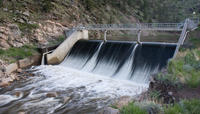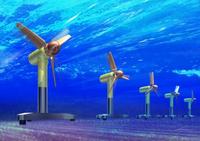-
Day of the nuclear battery nears

Experts in nuclear physics have helped develop research toward a “nuclear battery,” which could revolutionize the concept of portable power by packing in up to a million times more energy compared to a conventional battery.
-
-
New technology for carbon-dioxide capture, clean coal reaches milestone

An innovative new process which releases the energy in coal without burning — while capturing carbon dioxide, the major greenhouse gas — has passed a milestone on the route to possible commercial use.
-
-
Instead of a renaissance, U.S. nuclear energy industry is facing tough times
Five years ago, U.S. nuclear industry executives and energy industry analysts talked about an American nuclear renaissance, with up to twenty new reactors to be added to the nation’s stock. Things are very different today, however, and the U.S. nuclear energy industry, rather than expanding, is fighting to hold on.
-
-
Coal and U.S electric power generation

Coal is an important fuel source in the United States today. Responsible for approximately 39 percent of the country’s electrical generation, coal is vital to the day-to-day operation of people’s lives. The United States is rich in coal deposits, with large resources. One of the most important and largest of those deposits is found in the Powder River Basin (PRB) of Wyoming and Montana, which, in 2012, produced more than 42 percent of the nation’s coal.
-
-
Modified bacteria turn bio waste into fat for fuel

“Green” chemistry developed at Rice University is at the center of a new government effort to turn plant waste into fatty acids and then into fuel. A new project aims to develop a new generation of renewable energy and bio-based products from switchgrass and forestry residues and from a new hybrid of sorghum.
-
-
Much less additional land available for biofuel production
Amid efforts to expand production of biofuels, scientists are reporting new estimates that downgrade the amount of additional land available for growing fuel crops by almost 80 percent.
-
-
Wind power’s contribution has been overestimated

People have often thought that there is no upper bound for wind power — that it is one of the most scalable power sources. After all, gusts and breezes do not seem likely to “run out” on a global scale in the way oil wells might run dry. Yet the latest research in mesoscale atmospheric modeling suggests that the generating capacity of large-scale wind farms has been overestimated.
-
-
Hydroelectric power generation superior to nuclear and coal, beats oil and gas

Researchers have reviewed the economic, social, and environmental impact of hydro, coal, oil, gas, and nuclear power. Each has its advantages and disadvantages, but of these conventional electricity generation technologies, hydroelectric power appears to be the most sustainable and acceptable environmentally and economically.
-
-
New clean coal technology provides energy without burning
A new form of clean coal technology reached an important milestone recently, with the successful operation of a research-scale combustion system. The technology is now ready for testing at a larger scale. For 203 continuous hours, the combustion unit produced heat from coal while capturing 99 percent of the carbon dioxide produced in the reaction.
-
-
Novel nanosized antenna arrays key to effective harvesting of solar energy
For years, scientists have studied the potential benefits of a new branch of solar energy technology that relies on incredibly small nanosized antenna arrays that are theoretically capable of harvesting more than 70 percent of the sun’s electromagnetic radiation and simultaneously converting it into usable electric power. A novel fabrication technique could provide the breakthrough technology scientists have been looking for to improve today’s solar energy systems.
-
-
Wastewater from fracking is often highly radioactive
New studies have found that waste from fracking operations can be highly radioactive. A geological survey reported that millions of barrels of wastewater from unconventional wells in Pennsylvania and conventional wells in New York are 3,609 times more radioactive than the federal limit for drinking water, and 300 times more radioactive than a Nuclear Regulatory Commission limit for nuclear plant discharges.
-
-
Using silicon to produce hydrogen on demand
Super-small particles of silicon react with water to produce hydrogen almost instantaneously, according to researchers. In a series of experiments, the scientists created spherical silicon particles about ten nanometers in diameter. When combined with water, these particles reacted to form silicic acid (a nontoxic byproduct) and hydrogen — a potential source of energy for fuel cells.
-
-
Keystone pipeline clears another hurdle as Nebraska governor approves project
On Tuesday, Nebraska governor Dave Heineman notified President Obama that he approved the controversial Keystone XL pipeline to go through the state. This marks a significant step forward in the project, which was delayed by the administration last year.
-
-
Fracking generates less wastewater per unit of gas, but more overall
Hydraulically fractured natural gas wells are producing less wastewater per unit of gas recovered than conventional wells would. The scale of fracking operations in the Marcellus shale region – which stretches from New York to Virginia and accounts for about 10 percent of all natural gas produced in the United States today — is so vast, however, that the wastewater it produces threatens to overwhelm the region’s wastewater disposal capacity.
-
-
The untapped potential of tidal power

New research from a global group of scientists and engineers has been published in a special issue journal of the Royal Society. The work is in support of tidal power, which has the potential to provide more than 20 per cent of the U.K. electricity demand. While the predictable nature of tides makes them an ideal renewable energy source, more so than wind, the ability effectively to harness energy from the tides has so far proved elusive.
-
- All
- Regional
- Water
- Biometrics
- Borders/Immig
- Business
- Cybersecurity
- Detection
- Disasters
- Government
- Infrastructure
- International
- Public health
- Public Safety
- Communication interoperabillity
- Emergency services
- Emergency medical services
- Fire
- First response
- IEDs
- Law Enforcement
- Law Enforcement Technology
- Military technology
- Nonlethal weapons
- Nuclear weapons
- Personal protection equipment
- Police
- Notification /alert systems
- Situational awareness
- Weapons systems
- Sci-Tech
- Sector Reports
- Surveillance
- Transportation
Advertising & Marketing: advertise@newswirepubs.com
Editorial: editor@newswirepubs.com
General: info@newswirepubs.com
2010-2011 © News Wire Publications, LLC News Wire Publications, LLC
220 Old Country Road | Suite 200 | Mineola | New York | 11501
Permissions and Policies
Editorial: editor@newswirepubs.com
General: info@newswirepubs.com
2010-2011 © News Wire Publications, LLC News Wire Publications, LLC
220 Old Country Road | Suite 200 | Mineola | New York | 11501
Permissions and Policies
